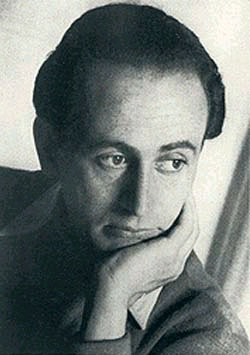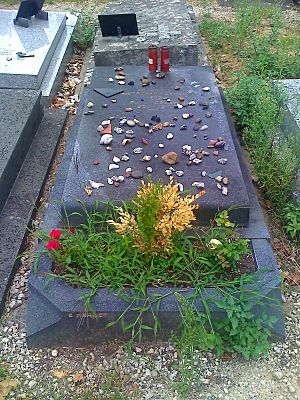Paul Celan facts for kids
Quick facts for kids
Paul Celan
|
|
|---|---|
 |
|
| Born | Paul Antschel 23 November 1920 Cernăuți, Kingdom of Romania (now Chernivtsi, Ukraine) |
| Died | 20 April 1970 (aged 49) Paris, France |
| Occupation | Writer |
| Language | German |
| Nationality | Romanian, French |
| Genre | Poetry, translation |
| Notable works | "Todesfuge" |
| Spouse | Gisèle Lestrange |
| Partner | Ingeborg Bachmann |
| Signature | |
Paul Celan (born Paul Antschel; 23 November 1920 – c. 20 April 1970) was a famous poet and translator. He was born in a place called Cernăuți, which was then part of Romania. Today, this city is known as Chernivtsi in Ukraine. Paul Celan wrote mainly in German and became one of the most important German-language poets after World War II.
Contents
Life Story of Paul Celan
His Early Years
Paul Celan grew up in a German-speaking Jewish family in Cernăuți. This area, called Bukovina, was part of Romania at the time. His father, Leo Antschel, wanted Paul to learn Hebrew at a Jewish school.
However, his mother, Fritzi, loved German literature. She made sure that German was the main language spoken at home. As a teenager, Paul became interested in social justice. He supported the Republican side during the Spanish Civil War. His very first known poem was written in 1938 and was called Mother's Day 1938.
Paul went to different schools in Cernăuți. He studied there from 1930 until he finished in 1938. During these years, he secretly started writing poetry.
In 1938, Paul traveled to Tours, France, to study medicine. He couldn't study in Vienna because of political changes happening in Austria. Also, it was harder for Jewish students to get into Romanian schools due to new rules. On his way to France, he passed through Berlin during a terrible event called Kristallnacht. This was a violent attack against Jewish people. He also met his uncle, Bruno Schrager, who later died in a concentration camp. Paul returned to Cernăuți in 1939 to study literature and Romance languages.
Life During World War II
In June 1940, the Soviet Union took over Bukovina. People started being sent away to Siberia. A year later, Romania took the area back. Then, Nazi Germany and the Romanian government created ghettos and forced people into hard labor.
In July 1941, German soldiers and their Romanian allies arrived in Cernăuți. They set the city's Great Synagogue on fire. In October, many Jewish people were forced into a ghetto. While in the ghetto, Paul translated Shakespeare's sonnets and kept writing his own poems. Before the ghetto was closed, Paul was forced to work. He cleared rubble from a destroyed post office and destroyed Russian books.
The local mayor, Traian Popovici, tried to help. But in June 1942, the governor of Bukovina ordered that Jewish people be rounded up and sent away. Paul hoped to convince his parents to leave the country to escape danger. But while Paul was away from home, on 21 June 1942, his parents were taken. They were sent by train to a camp in Transnistria. Many people died there. Paul's father likely died from a disease called typhus. His mother was shot after being worn out by forced labor. Later that year, Paul was in a labor camp in Romania. He then heard the sad news of his parents' deaths.
Paul stayed in a work camp until February 1944. The Soviet army's advance forced the Romanians to leave the camps. Paul returned to Cernăuți shortly before the Soviets came back. He worked briefly as a nurse. Friends from that time remember Paul feeling very guilty. He had tried to convince his parents to hide before they were taken away.
Life After the War
After the war, Paul thought about moving to Palestine. In 1945, he left Cernăuți and went to Bucharest, Romania. He stayed there until 1947. He was active in the Jewish writing community. He translated Russian literature into Romanian and published his own poems. He used different pen names, including "Paul Celan." In Bucharest, he met other poets like Rose Ausländer. He used some ideas from their works in his famous poem "Todesfuge" (Death Fugue).
A version of "Todesfuge" was published in Romanian in May 1947. It was explained that the dancing and music in the poem showed the harsh realities of life in the concentration camps.
Moving to Paris
When the communist government came to power in Romania, Paul Celan moved to Vienna, Austria. There, he met Ingeborg Bachmann, another poet. Vienna was still recovering from the war. In 1948, he moved to Paris, France. His first poetry book, Der Sand aus den Urnen ("Sand from the Urns"), was published that year. His first few years in Paris were lonely. He wrote many letters to his friends, expressing how isolated he felt.
In 1952, Paul Celan's writing started to become well-known. He read his poems in Germany at a meeting of writers called Group 47. He read his poem Todesfuge ("Death Fugue"), which described life in a concentration camp.
In November 1951, he met Gisèle Lestrange, an artist, in Paris. They got married on 21 December 1952. Her wealthy family did not approve, but they married anyway. Over the next 18 years, they wrote more than 700 letters to each other. Paul earned a living by translating and teaching German at a school in Paris. He was also a close friend of Nelly Sachs, who later won the Nobel Prize for literature.
Paul Celan became a French citizen in 1955 and continued to live in Paris. He felt more and more that people were unfairly criticizing him. The wife of a friend, Yvan Goll, wrongly accused him of copying her husband's work. Despite this, Paul Celan received important awards. He won the Bremen Literature Prize in 1958 and the Georg Büchner Prize in 1960.
Paul Celan passed away in Paris around April 1970.
His Poetry and Writing Style
The death of his parents and his experiences during the Holocaust deeply affected Paul Celan's poetry. These events shaped how he used language in his poems.
Paul Celan once said: "There is nothing in the world for which a poet will give up writing, not even when he is a Jew and the language of his poems is German." This shows how important writing in German was to him.
His most famous poem, "Todesfuge" (Death Fugue), is a powerful and complex work. It may have been inspired by another poet from his hometown. The characters in the poem, Margarete and Sulamith, can represent Jewish and German culture. The "Master from Germany" with blue eyes stands for German Nazism.
As he got older, his poems became more mysterious and broken. He also started using many new German words. Some people felt he was trying to change or even destroy the German language. Others believed he kept a special musical quality in his German writing. He once wrote to his wife that the German he spoke was different from the German people spoke in Germany. Writing in German helped him remember his parents, especially his mother, who taught him the language.
Besides writing poetry in German and Romanian, Paul Celan was also a very active translator. He knew many languages and translated books from Romanian, French, Spanish, Portuguese, Italian, Russian, Hebrew, and English into German.
Awards
- Bremen Literature Prize 1958
- Georg Büchner Prize 1960
Why He Is Important
Many people believe Paul Celan is one of the most important German poets ever. Even though his poems can be difficult to understand, many scholars study his work. Thousands of academic papers have been written about his poetry. Many famous thinkers have also written books about his writing.
In Film
The Dreamed Ones (Die Geträumten; 2016) is a movie based on the letters exchanged between Paul Celan and poet Ingeborg Bachmann. Their letters were written over almost 20 years. The film won several awards.
Audio-visual Works
You can find recordings of Paul Celan's work:
- Ich hörte sagen, where he reads his own poems.
- Gedichte, where he reads his translations of other poets.
- Some of his poems have been set to music and sung by artists like Ute Lemper.
Images for kids
See also
 In Spanish: Paul Celan para niños
In Spanish: Paul Celan para niños
 | Frances Mary Albrier |
 | Whitney Young |
 | Muhammad Ali |



